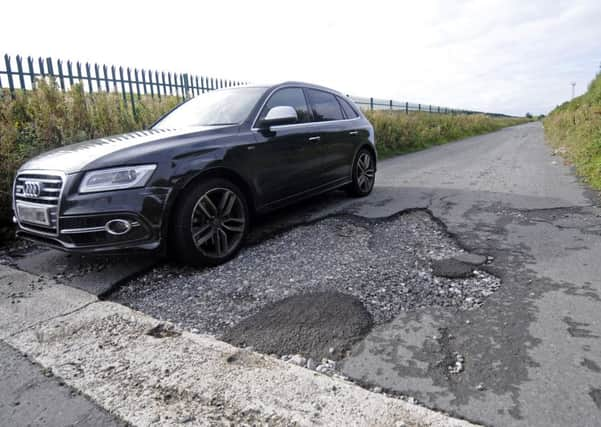Letters - December 13, 2016


Think seriously about this – potholes are not caused by wear and tear, they’re caused by the contracters laying the asphalt so thin on the sub base that it doesn’t last two minutes!
The motorway doesn’t have potholes, the prom doesn’t have potholes, nor does Amounderness Way.
Advertisement
Hide AdAdvertisement
Hide AdHowever, nearly all B-roads have them, the reason being that, in theory, it’s keeping contractors in work by laying the asphalt as thin as possible, so they have to go back.
Money being spent on tenuous pie in the sky ideas – such as tramways on a road to nowhere, hotels in contentious locations – rather than on improving the state of our roads, appears to be more of a profitable exercise to the council hierarchy.
Potholes are dangerous, especially in icy weather, so to have more is hovering on the edge of the ridiculous.
Brin the trotter
address supplied
POLITICS
These new populists despise Parliament
We cannot seem to escape the word ‘populism’. The word champions the common people by favourable contrast with an elite. It can designate democratic or authoritarian movements. It became common in America in 1892 when a People’s Party was formed. The party demanded direct democracy through popular initiatives and referenda.
Advertisement
Hide AdAdvertisement
Hide AdToday it is closely associated with leaders of an authoritarian form of politics.There are many examples from recent governments in Latin America, and one or two in this country. Donald Trump is a recent example in the US.
The suggestion put forward by populists that the courts must rule in favour of the government over Article 50, because to do otherwise would stoke resentment among Brexiteers, is an outrageous example of rampant populism. It is a thinly veiled piece of blackmail. It is also a misrepresentation of what courts are for. The Supreme Court is interpreting the law. It is interpreting whether the power of governments to agree treaties extends to their power over Article 50. It is foolish to complain that we voted in June and haven’t left yet.
Populists attack anybody who challenges their exclusive right to define or interpret the national interest. They despise parliament hence it must be attacked. Their views are wrong and dangerous. Argument and compromise is essential in a liberal democracy.
We must not allow our plural society to be undermined by them.
Dr Barry Clayton
Thornton-Cleveleys
POLITICS
Fix one problem, but others still remain
Advertisement
Hide AdAdvertisement
Hide AdThe Boundary Commission cannot be blamed for recommending radical changes to existing parliamentary constituencies.
The fault lies with the instruction they were given to reduce the number of constituencies while at the same time, in the interests of fairness, ensuring that the number of electors in each constituency lies within certain limits.
While this may work in large urban areas, the inevitable consequence in other parts of the UK is the formation of some constituencies with little or no community of interest.
With future increases in and shifts of population, keeping the number of electors within fixed limits means that further boundary changes will be inevitable.
Advertisement
Hide AdAdvertisement
Hide AdWhile basing constituencies on local government boundaries would ensure a community of interest, they would necessarily have very different numbers of electors; solving one problem creates another.
In 2015, the Isle of Wight had 108,204 electors while Na h Eileana an Iar (Western Isles) had just 21,769. If the current system of single-member constituencies is retained, and that is a debatable point, then my proposed solution would be to weight the voting power of each Member of Parliament to reflect the number of registered electors in his/her constituency. This would require parliament to abandon the current system of voting by trooping through the lobbies and to adopt an updated system of electronic voting.
Clearly the time might come when the number of electors in a constituency might increase or decrease so much that some boundary changes would be required, but not all at the same time.
Tony Cooper
via email
TECHNOLOGY
Young people need more digital training
Those we take for granted as “digital natives” are not all having a good experience online. A new Prince’s Trust report, Slipping through the Net, carried out by the LSE and supported by Samsung, raises serious concerns about young people’s vulnerability online and is causing them to fall further behind in life.
Advertisement
Hide AdAdvertisement
Hide AdMany young people across the North West lack the rudimentary skills they need to navigate the online world with confidence.
The research highlights that in the North West, around 62 per cent of young people struggle in dealing with the negative behaviour of others online. 39 per cent of them say that no one or almost no one could be trusted online.
While an emphasis is often put on developing young people’s technical abilities online, our report calls for increased training around softer skills to help the next generation use the internet effectively and ensure their wellbeing online. Acquiring these skills will help them harness all the internet has to offer in terms of education and employment prospects.
We hope government, business and other youth groups will join us in developing new solutions to ensure young people can not only navigate the internet safely, but also make the most of the online world.
Jonathan Townsend
North of England Director at The Prince’s Trust